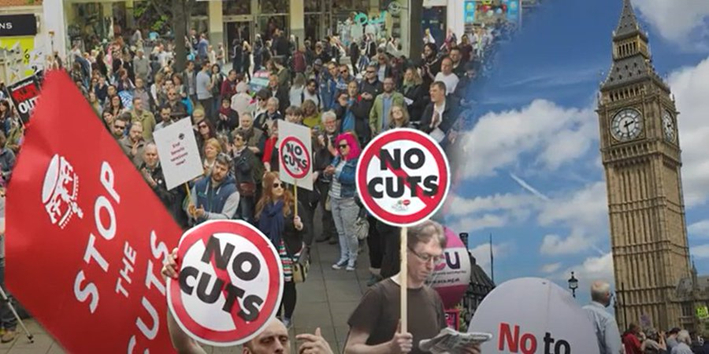Austerity created a fertile ground for the UK Independence Party’s populist, Eurosceptic agenda and likely tipped the scales in favor of the 2016 Brexit vote. While those political outcomes are evident, the reasons behind citizens’ voting decisions—and their broader demands—remain less understood. Our recent research, published in the Oxford Bulletin of Economics and Statistics, takes a step back from focusing solely on UK voting results and instead explores how austerity influences political participation. Specifically, we examined voting, advocating for reform, and protesting in the UK, offering new insights into how fiscal policies shape people’s demands and democratic engagement against a backdrop of rising inequality and social discontent.
UK Austerity: A Deep Socioeconomic Shift
In response to growing national debt, the UK government adopted austerity policies that included raising consumption taxes, freezing public-sector pay, and cutting welfare spending by £32 billion (according to official reports). These measures disproportionately hit lower-income groups, magnifying hardship and inequality.
Amid these changes, public debate intensified around austerity’s potential to fuel political polarization and social unrest. Seminal work by Fetzer (2019) suggests that austerity fostered the climate in which UKIP’s populist, Eurosceptic messaging thrived. Yet, researchers have rarely looked beyond election outcomes to understand exactly why people choose certain forms of participation—or why their views shift. Between 2010 and 2017, voter turnout increased, while protests and calls for political reform also surged during the first austerity plan and ahead of the Brexit vote (2010–2015). Meanwhile, rising hardship and intense debate over welfare coincided with stronger public support for redistribution. Could shifting preferences for redistribution be the link between austerity and increased political engagement?
How Austerity Shapes Political Engagement
Our study explores whether people’s views on income redistribution serve as a channel through which austerity influences political participation in the UK. To do this, we combined both observational and experimental data to better understand these dynamics.
First, we examined representative micro-level panel data and found a significant correlation between exposure to austerity, political participation, and preferences for redistribution. Our findings indicate that individuals who experienced austerity were more likely to vote and appeal to the government for reform. They also expressed stronger support for redistribution policies. However, we did not find a significant link between exposure to austerity and participation in protests.
To further investigate the causal impact of austerity, we conducted an online survey experiment with a large sample of UK residents. In this experiment, we simulated exposure to austerity by presenting participants with a professionally produced three-minute video explaining the UK’s austerity measures. The video used clear visuals and accessible language to ensure participants could fully grasp the economic policies being discussed.
Participants were divided into two groups. The first group watched a video outlining why the UK government introduced its austerity program in 2011, covering its main policies and overall costs. The second group viewed the same video but with additional content highlighting the socioeconomic impact of austerity on low-income households.
The results of our experiment aligned with the findings from the panel data analysis. Exposure to austerity increased participants’ likelihood of voting and signing a petition against austerity by 4.3 and 9.6 percentage points, respectively. Additionally, we found that people who watched the videos were more likely to support higher taxes on the wealthy and greater investment in welfare and social security.
These results suggest that austerity did not just shape economic hardship but also influenced people’s political preferences. It’s possible that UKIP capitalized on this demand for redistribution—particularly among lower-income voters—by crafting messages that resonated with public frustration, even if their proposed solutions did not align with economic realities.
Conclusions
Although austerity policies aimed to address economic challenges, they also reshaped political engagement and views on redistribution. The swift downfall of UK Prime Minister Liz Truss after only 42 days in office underscores the risks of ignoring public demands for more equitable policies: her plan to cut taxes for the wealthy failed to resonate with many voters, including some Brexit supporters.
With a number of European countries contemplating renewed austerity measures, it’s crucial to understand how such policies can alter individual preferences—and, in turn, influence political participation. Recognizing and acting on these shifting demands is essential for maintaining a stable and responsive democracy.
For a more in-depth analysis, the research findings are published in the Oxford Bulletin of Economics and Statistics and can be accessed here .





